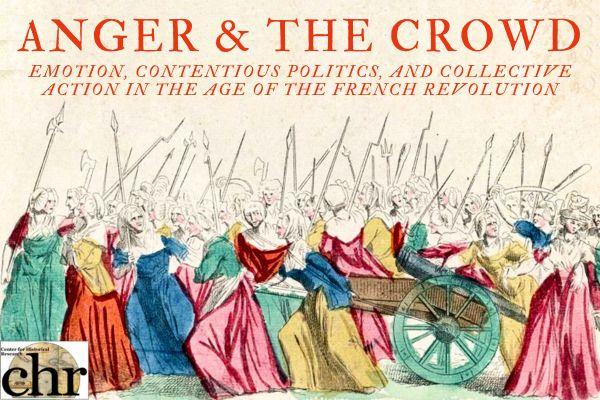
This event has been converted an a live-streamed presentation.
A presentation by David Andress, Professor of Modern History, University of Portsmouth and Katie Jarvis, Assoc. Professor of History, University of Notre Dame, and Margaret Newell (Moderator), Distinguished Professor of History, Ohio State University.
From the Revolution’s earliest days, crowds were pivotal. A Parisian crowd toppled the symbol of the Old Regime’s despotism: the Bastille. A crowd led by Parisian market women brought the revolutionary National Assembly and the royal family away from the palace at Versailles and into the heart of the capital of Paris. Throughout the decade that followed, the Revolutionary crowd remained a significant political force—one to which the elected leaders in the National Assembly listened.
Understanding the formation, psychology, communication, and political aims of the revolutionary crowd has been a subject of scholarly study for at least fifty years. Recent work has made clear that peaceful collective action was a hallmark of the Revolution. Nevertheless, the specter of political violence remains in the ways that the Revolution is remembered—the linking of political violence and crowds so vividly rendered by early critics, such as Charles Dickens and Edmund Burke, has continued to resonate. Moreover, collective action remains an important locus of political communication and activity today.
The French Revolutionary crowd is an especially rich case for considering up close the connections between collective action, democracy, and the power of emotion.
About David Andress
David Andress is Principal Lecturer in Modern European History at the University of Portsmouth. Some of his recent publications include: The French Revolution and the People (Hambledon, 2004), Massacre at the Champ de Mars: Popular Dissent and Political Culture in the French Revolution (Boydell, 2000), and The Terror: The Merciless War for Freedom in Revolutionary France (Straus, 2006).
About Katie Jarvis
Katie Jarvis is the Carl E. Koch Associate Professor of History at the University of Notre Dame. Her recent book is entitled Politics in the Marketplace: Work, Gender, and Citizenship in Revolutionary France (Oxford University Press, 2019). She is currently working on a book project entitled Democratizing Forgiveness: Reconciling Citizens in Revolutionary France. This study probes how the French revolutionaries refashioned forgiveness through economic, judicial, and cultural venues from 1789 to 1802.
About Margaret Newell
Margaret Newell is a College of Arts and Sciences Distinguished Professor at Ohio State University. Her research and teaching interests include colonial and Revolutionary America, Native American History, the history of slavery, economic history, material culture, and comparative colonial American/Latin American History. Her book, Brethren by Nature: New England Indians, Colonists, and the Origins of American Slavery won the 2016 James A. Rawley prize for the best book on the history of race relations in the U.S. and also received the 2016 Peter J. Gomes Memorial Prize from the Massachusetts Historical Society.
Co-sponsor: Department of French and Italian
